You Want Your Real Dad? He Can Pay for Your Wedding Too.
OP (not the original poster) shared the story of a stepfather who had been a constant figure in his stepdaughter’s life for over a decade. Though he wasn’t married to her mom, they had lived together for 10 years, and he’d taken on all the roles of a provider and parental figure. He paid for her entire college tuition — a cool $40,000. He bought her a car. He housed her while she went to school. Meanwhile, her biological father was mostly absent, popping in and out and breaking promises.
Still, when wedding planning began, things started feeling off. The bride and her mother (OP’s partner) became consumed with wedding details. OP was covering all the costs but was given no real voice. He was allowed to invite 20 people, a modest request considering he was bankrolling the entire event. But when one of his invited guests mentioned they hadn’t received a real invite — just a vague announcement — he found out none of his friends were actually on the guest list. His name wasn’t even on the invitations. Only her mom and “Real Dad” were listed.
Then came the final blow: at a pre-wedding family dinner, the bride announced that her “Real Dad” would be giving her away. Everyone clapped. Everyone celebrated — except OP. He stayed calm, stood up, and delivered a short, cutting toast where he announced that if “Real Dad” was good enough to give her away, then “Real Dad” could also pick up the tab. He then proceeded to withdraw his financial support, cancel wedding payments, and ask his girlfriend and her daughter to move out. He wasn’t angry — he was done.
This man was more than happy to fund his stepdaughter’s wedding

Until he realized that he was expected to foot the bill without being involved in the big day at all












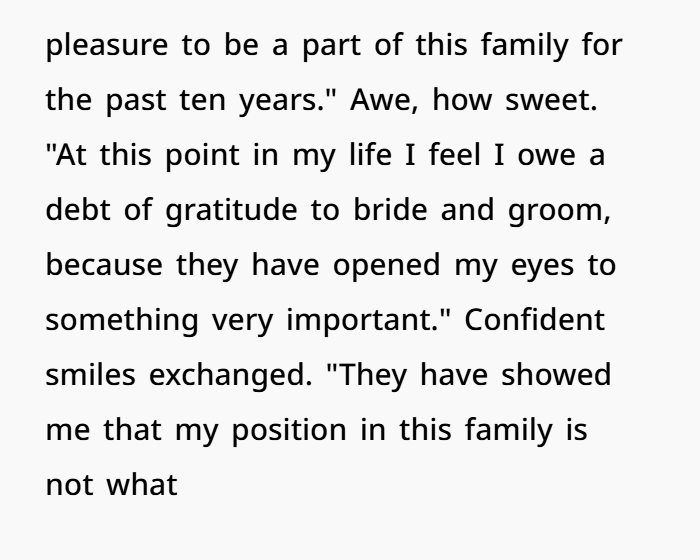
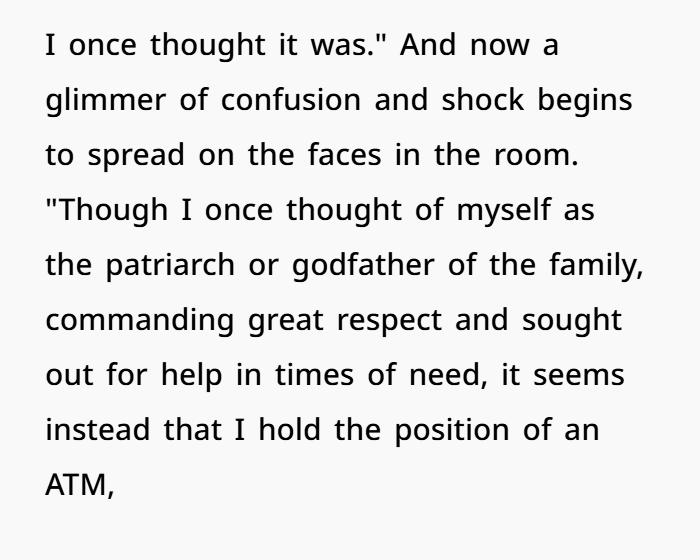
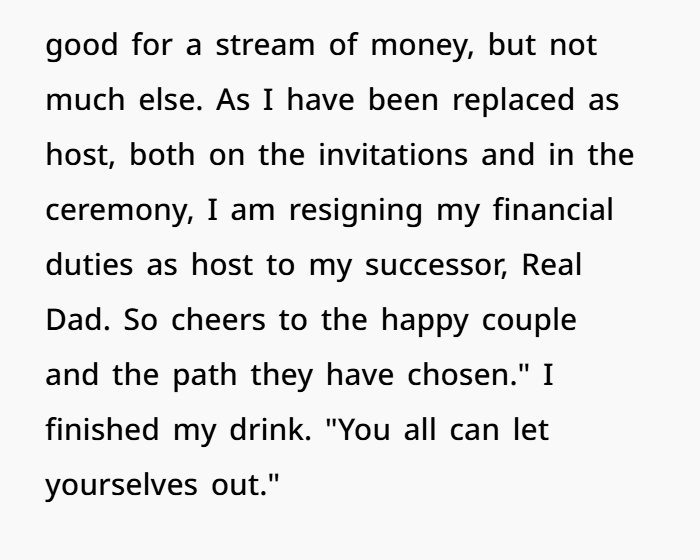




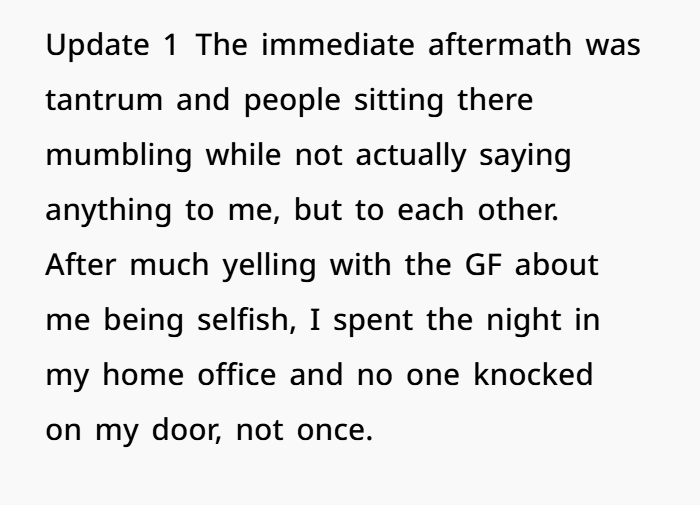


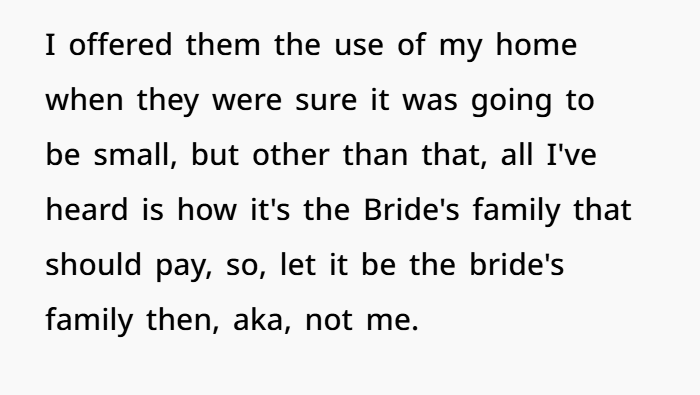




Let’s break this down — because it’s not just a story about a wedding. This one hits deep in the heart of step-parent expectations, toxic family dynamics, and how some people will use others financially without ever giving them emotional recognition.
1. He wasn’t just a boyfriend — he was a stepfather in all but name
A lot of folks might skim the part where OP mentions “we’re not married” and assume this was casual. But think about it:
- Ten years living together.
- He paid for college.
- Bought her a car.
- Housed and supported her through college and after.
That’s father-level responsibility. Not just financially, but logistically and emotionally. That kind of support is what defines parenthood — not DNA. And for all that, he was left completely out of the biggest moment of her life.

This is where it stings — because he wasn’t just footing the bill, he was invested. And to be left off the invitation entirely? Not even acknowledged in print? It’s not just a slip-up — it’s a message.
2. Emotional labor and financial exploitation
Let’s talk about what really happened here. OP wasn’t just left out — he was used. This is a pattern that happens a lot in blended families where the step-parent gives everything and still ends up second-best (or invisible).
He gave:
- Money (college, car, housing, wedding)
- Time (10 years of support)
- Stability (consistent presence vs the deadbeat dad)
What did he get in return? A pat on the back? A thank-you card? Nope. He got slapped in the face when the daughter made it clear: she didn’t see him as her “real dad” — just the guy who paid for stuff.
Was she legally obligated to have him give her away? Of course not. But weddings aren’t just about legality — they’re about acknowledgment, love, and gratitude. And there was none of that here.
3. The “Real Dad” trope
Here’s the part that stings for a lot of stepparents: being replaced at the last second by a bio parent who did nothing.
OP described the father as a “deadbeat.” He wasn’t involved in her education, didn’t help financially, and had a history of letting her down. But he still got the honor. He got the applause. He got the moment.
That’s the heartbreaking part — because this wasn’t about who deserved it. It was about fantasy over reality.
In psychology, there’s a term called “idealized attachment” — where a person clings to a parent figure, not because of what they’ve done, but because of who they should have been. Kids do it all the time with absent parents. It’s a kind of emotional denial.
The bride wanted her “Real Dad” to step into the spotlight for five minutes — ignoring the man who stood in for her father for ten years straight.
4. The savage toast: “You want him? He can pay too.”
Let’s be real — this toast is legendary. It’s not just petty (though it’s a little petty). It’s powerful.
He didn’t scream. He didn’t cause a scene. He calmly exposed the truth: “I see where I stand now. I’m not a father to you. I’m an ATM. So I’m done.”
That’s not selfish. That’s called self-respect.
Too often, people (especially men in provider roles) are expected to keep giving even when they’re being treated like trash. The second they say “no,” everyone accuses them of being cold or dramatic. But there comes a time when you have to pull the plug — financially and emotionally.
5. The aftermath: moving out, changed locks, no regrets
What followed was more emotional manipulation. His girlfriend brought him the wedding planner, trying to guilt-trip him by showing how much they had planned. But instead, it just revealed even more disregard — songs picked for the bio dad, food he was allergic to on the menu, a total absence of thought for the man footing the bill.

That wasn’t a mistake. That was willful disrespect.
So he did the smart thing:
- Pulled the money.
- Called vendors.
- Took a financial hit, but kept his dignity.
- Asked them to move out.
- Changed the locks.
No violence. No revenge. Just peace.
And when his girlfriend tried to write herself a check from their joint account the next day? It only proved he made the right call.
6. Lessons for others in blended families
This story might feel extreme — but it’s not uncommon. Many stepparents, especially stepdads, face this kind of invisibility. They’re expected to provide, but not expect love. Expected to help, but not have a voice.
Some key lessons:
- Don’t fund something you’re not respected in.
- Don’t stay in a relationship where your efforts are invisible.
- Set clear boundaries early: if I’m supporting, I need to be included.
- Love freely, but don’t ignore the red flags.
Later, the author responded to a couple of comments from readers and shared a few more details






This man didn’t throw a tantrum. He just saw the truth — that they never truly saw him as family. And instead of sticking around and letting them continue to bleed him dry, he tapped out with class.
No one wants to admit they were just the wallet in someone else’s story. But once you realize it, the smartest thing you can do is leave the table. That’s exactly what he did — and he walked away with his head high.

